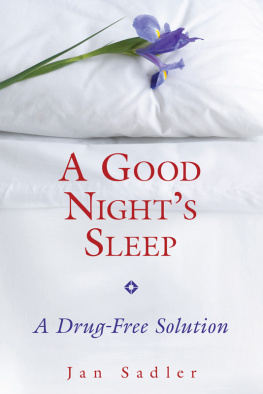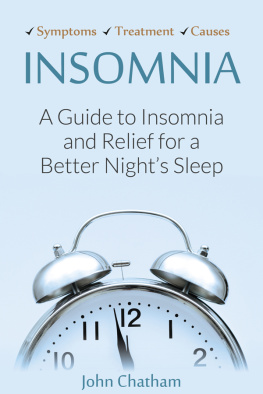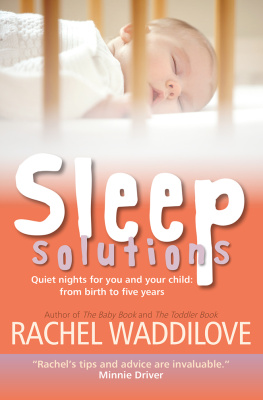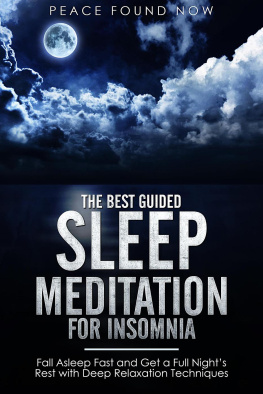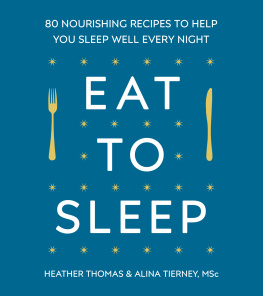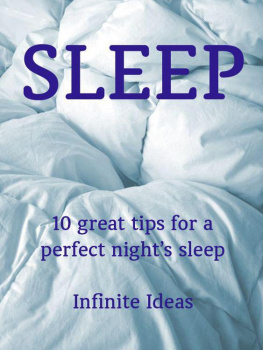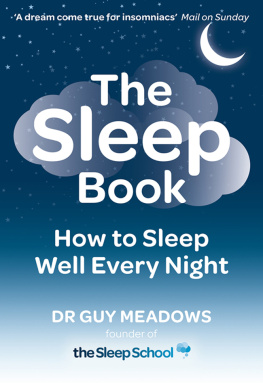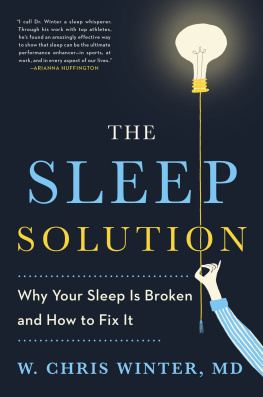A GOOD
NIGHTS
SLEEP

A Drug-Free Solution
Jan Sadler

Contents

The techniques in A Good Nights Sleep can be used alongside conventional medical treatments. If you have long-term insomnia, please consult your doctor, as you may have a more serious medical problem.
Introduction
I f you find that achieving peaceful sleep is a major challenge in your life, you are not alone. Poor sleep is a very common experience, with most adults suffering from insomnia at some time in their lives. Loss of sleep can be the cause of great anxiety and distress, both for the sufferers and for those around them. The good news is that with the methods described in this book, a good nights sleep will soon be yours. Your confidence in your sleep will grow as you experience more and more nights of peaceful, refreshing sleep and so lead you into a natural and normal pattern of sleep.
First, the techniques I describe in the book will give you the tools you need for the Peaceful Sleep Bedtime Routine. The Peaceful Sleep Bedtime Routine is a unique relaxation and visualization program to ease you gently into a deep and peaceful sleep at bedtime.
Second, the same simple techniques will enable you, in the longer term, to address lifestyle issues that may be the underlying cause of your sleeplessness. You will be able to build such a lifestyle for yourself that, in the future, deep and peaceful sleep will come automatically every night without necessarily having to use the Peaceful Sleep Bedtime Routine.
When your life is in balance and you live harmoniously with those around you, you sleep easily. If you consistently use the practical and dynamic methods in the book, many other aspects of your life will show signs of positive and welcome change. A happier and more focused, confident, and contented you will emerge. When you take care of your bodys and minds needs in the way described, your whole life becomes enriched, and your reward is a balanced, happy life full of well-being and vitality.
It is true to say that we grow toward that on which we focus our minds. By focusing on how you would like your sleep to be and on ways of helping yourself toward that goal, you will achieve success. Read the Peaceful Sleep Ideal below and hold it in your mind as your goal, because what you choose to think about really does decide your reality. The Peaceful Sleep Ideal is more than a dream; it can come true for you. Success is in your own hands, and now with this book and the accompanying CD, you have all you need to be successful.
YOUR AIMTHE PEACEFUL SLEEP IDEAL
- At bedtime, you feel pleasantly tired and ready for bed, with no thoughts or worries about the coming night and what it will bring.
- You have no need for pills or alcohol to make you sleep.
- In bed, you drift easily into a deep and peaceful sleep for the whole night.
- During the night you waken rarely, or, if you do wake up, you fall asleep again effortlessly.
- You awaken refreshed, full of energy and vitality, ready to begin the day with enthusiasm and vigor.
- You enjoy this good, restorative sleep pattern on a regular basis.
This Peaceful Sleep Ideal is the normal, natural pattern of sleep, and it will soon be true for you. This book and the accompanying CD will show you how to uncover your own inner strengths and abilities and how to develop a new peaceful and restful sleep habit, thus ensuring a long-lasting solution to the challenge of poor sleep. No matter what the cause of your sleep difficulties, you can now be assured of successand enjoy peaceful sleep every night!
1
Stress-Free Days for Tranquil Nights
T he Peaceful Sleep strategy for promoting good-quality sleep includes a number of easy-to-use techniques for you to practice during the day. When combined at night, these same techniques compose the Peaceful Sleep Bedtime Routine. This is the routine you will use when you are actually in bed and want to go to sleep. You will need to take a little time out of your busy day to practice and use these techniques, as well as using them at night.
As a bonus, the techniques you learn will ensure that your day is as calm, enjoyable, and peaceful as possible. The way we live our day affects the way we sleep at night! You will learn to handle any challenges or upsets during the day so that you dont spend the night tossing and turning with unhelpful, anxious, or disturbing thoughts whirling around your mind.
Stress of any kind is a major cause of unsettled sleep. Most of the difficulties involving sleep are caused by challenges from the day that have not been addressed or resolved. Your brain takes advantage of the peace and quiet of the night to bring all these unfinished matters to the forefront of your attention. With no other distractions, your mind can churn the days events with all their frustrations and unresolved issues, over and over.
Sometimes sleeplessness can be the result of a short-term stressful event that caused a few nights of poor sleep. Those few sleep-disturbed nights may have triggered a downward spiral of anxiety and negative thinking about sleeping that led to yet more poor sleep. As this pattern of poor sleep developed, the original cause may even have been forgotten. The stress from the anxiety and concern about sleeping becomes the main concern, rather than the cause of the insomnia. So a cycle is set up of poor sleep/worry about sleep/poor sleep and so on.
Stress is increasingly common in our modern lives. There have never been so many changes in society as in our lifetime, and the pace of change increases all the time. Most of us find too much change and at too fast a pace enormously demanding. Both external forces, like change, or internal pressures that we put on ourselves in this competitive world can be responsible for increased stress. Today, even children feel the pressure to achieve from a relatively young age.
Another source of strain is the information with which we are constantly bombarded, all of it requiring some kind of response once it enters our consciousness. Much of the information we receive is negative. For example, there are newspaper and television reports of disasters of many kinds about which we can do very little on a personal level. In the past, we would not even have known about these events.
However, most stress comes from the daily trivia and incessant minor irritations that use up our energy. One major source of stress is the variety of mechanical and electronic equipment that is part of modern life, which can generate frustration when it breaks down or doesnt behave as we expect. Overstimulation during the day or in the evening can also contribute to a broken nights sleep. The adrenaline produced from overexcitement inhibits sleep; instead of being able to relax, you end up with a spinning mind and a restless, uncomfortable night.
We all need a certain amount of stress to give enjoyment and a zing to our lives and to release our creative powers. Without stress, we would soon become bored from lack of challenge, which is just as stressful as being overstretched. When we have too much stress, we end each day feeling as though there has been too much for us to do. We need to find a balance, with just the right amount of stress to keep us lively and stimulated and yet able to cope with lifes ups and downs without being overextended.
You may not be able to solve or resolve any short- or long-term stress in an instant, but you can start the recovery process by seeking and using positive ways to reduce the stress in your life. When you take charge in this beneficial way, you break the downward spiral of stress, negative feelings, and disturbed sleep.
Next page
